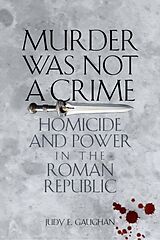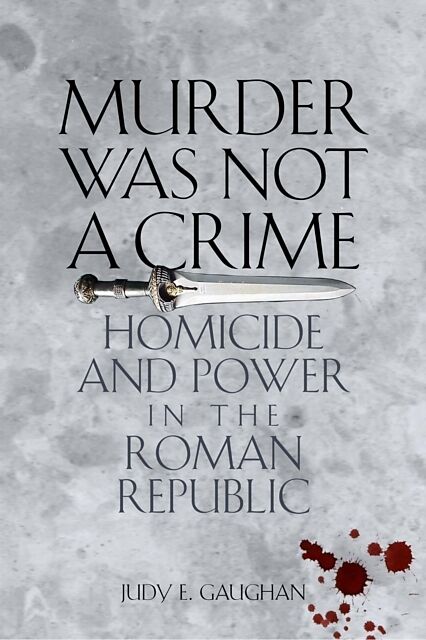Murder Was Not a Crime
Einband:
Kartonierter Einband
EAN:
9780292725676
Untertitel:
Homicide and Power in the Roman Republic
Autor:
Judy E. Gaughan
Herausgeber:
University of Texas Press
Anzahl Seiten:
216
Erscheinungsdatum:
15.01.2010
ISBN:
0292725671
Informationen zum Autor Judy E. Gaughan teaches at Colorado State University. Klappentext Embarking on a unique study of Roman criminal law, Judy Gaughan has developed a novel understanding of the nature of social and political power dynamics in republican government. Revealing the significant relationship between political power and attitudes toward homicide in the Roman republic, Murder Was Not a Crime describes a legal system through which families (rather than the government) were given the power to mete out punishment for murder.With implications that could modify the most fundamental beliefs about the Roman republic, Gaughan's research maintains that Roman criminal law did not contain a specific enactment against murder, although it had done so prior to the overthrow of the monarchy. While kings felt an imperative to hold monopoly over the power to kill, Gaughan argues, the republic phase ushered in a form of decentralized government that did not see itself as vulnerable to challenge by an act of murder. And the power possessed by individual families ensured that the government would not attain the responsibility for punishing homicidal violence.Drawing on surviving Roman laws and literary sources, Murder Was Not a Crime also explores the dictator Sulla's "murder law," arguing that it lacked any government concept of murder and was instead simply a collection of earlier statutes repressing poisoning, arson, and the carrying of weapons. Reinterpreting a spectrum of scenarios, Gaughan makes new distinctions between the paternal head of household and his power over life and death, versus the power of consuls and praetors to command and kill. Zusammenfassung This pathfinding study looks at how homicide was treated in Roman law from the Roman monarchy through the dictatorship of Sulla (ca. 753-79 BC) to show how criminal law can reveal important aspects of the nature and evolution of political power. Inhaltsverzeichnis AbbreviationsPrefaceAcknowledgmentsIntroductionChapter One: Killing and the KingChapter Two: Power of Life and Death: Pater and Res PublicaChapter Three: Killing and the Law, 509-450 B.C.E.Chapter Four: Murder Was Not a Crime, 449-81 B.C.E.Chapter Five: Capital Jurisdiction, 449-81 B.C.E.Chapter Six: License to KillChapter Seven: Centralization of Power and Sullan AmbiguityEpilogueNotesBibliographyIndex...
Autorentext
Judy E. Gaughan teaches at Colorado State University.
Klappentext
Embarking on a unique study of Roman criminal law, Judy Gaughan has developed a novel understanding of the nature of social and political power dynamics in republican government. Revealing the significant relationship between political power and attitudes toward homicide in the Roman republic, Murder Was Not a Crime describes a legal system through which families (rather than the government) were given the power to mete out punishment for murder. With implications that could modify the most fundamental beliefs about the Roman republic, Gaughan's research maintains that Roman criminal law did not contain a specific enactment against murder, although it had done so prior to the overthrow of the monarchy. While kings felt an imperative to hold monopoly over the power to kill, Gaughan argues, the republic phase ushered in a form of decentralized government that did not see itself as vulnerable to challenge by an act of murder. And the power possessed by individual families ensured that the government would not attain the responsibility for punishing homicidal violence. Drawing on surviving Roman laws and literary sources, Murder Was Not a Crime also explores the dictator Sulla's "murder law," arguing that it lacked any government concept of murder and was instead simply a collection of earlier statutes repressing poisoning, arson, and the carrying of weapons. Reinterpreting a spectrum of scenarios, Gaughan makes new distinctions between the paternal head of household and his power over life and death, versus the power of consuls and praetors to command and kill.
Zusammenfassung
This pathfinding study looks at how homicide was treated in Roman law from the Roman monarchy through the dictatorship of Sulla (ca. 753-79 BC) to show how criminal law can reveal important aspects of the nature and evolution of political power.
Inhalt
AbbreviationsPrefaceAcknowledgmentsIntroductionChapter One: Killing and the KingChapter Two: Power of Life and Death: Pater and Res PublicaChapter Three: Killing and the Law, 509-450 B.C.E.Chapter Four: Murder Was Not a Crime, 449-81 B.C.E.Chapter Five: Capital Jurisdiction, 449-81 B.C.E.Chapter Six: License to KillChapter Seven: Centralization of Power and Sullan AmbiguityEpilogueNotesBibliographyIndex

Leider konnten wir für diesen Artikel keine Preise ermitteln ...
billigbuch.ch sucht jetzt für Sie die besten Angebote ...
Die aktuellen Verkaufspreise von 6 Onlineshops werden in Realtime abgefragt.
Sie können das gewünschte Produkt anschliessend direkt beim Anbieter Ihrer Wahl bestellen.
Loading...
Die aktuellen Verkaufspreise von 6 Onlineshops werden in Realtime abgefragt.
Sie können das gewünschte Produkt anschliessend direkt beim Anbieter Ihrer Wahl bestellen.
| # | Onlineshop | Preis CHF | Versand CHF | Total CHF | ||
|---|---|---|---|---|---|---|
| 1 | Seller | 0.00 | 0.00 | 0.00 |
